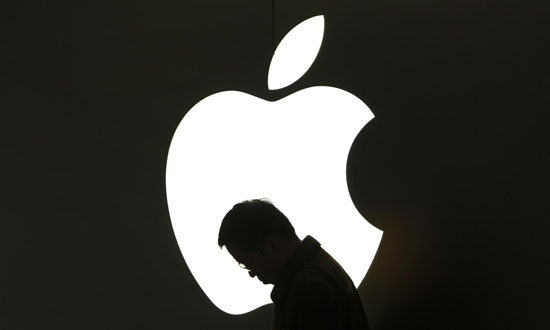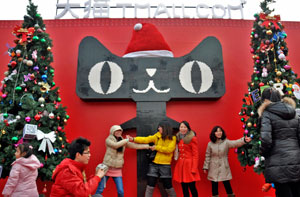
BEIJING -- A group of Chinese writers have filed a claim against Apple, alleging that the company's App Store sells unlicensed copies of their books and seeking 50 million yuan ($7.9 million) in compensation.
The claim, filed on behalf of 22 famous writers, involves 95 books that have allegedly been sold as pirated copies on Apple's App Store.
 |
|
A man looks his an Apple iPad in front an Apple logo outside an Apple store in downtown Shanghai March 16, 2012.?[Photo/Agencies] |
The writers, including Han Han, He Ma and Nanpai Sanshu, have teamed up and set up a writers' rights alliance. The alliance has already sent a lawyer's letter to Apple and is waiting for the company's reply, said Bei Zhicheng, head of the alliance.
The group said Apple takes a 30 percent cut from app sales on the platform.
The group also claimed that when the Californian company was notified about the pirated content, it was too slow to remove the products.
Public relations spokeswoman for Apple Huang Yu'na said in an email to media that Apple understands the importance of protecting intellectual property rights. The company will "respond properly and timely" to complaints.
The National Copyright Administration confirmed on Saturday that the App Store is suspected of piracy and copyright infringement, but it has to consult with other "relevant departments" to make a judgment.
Meanwhile, Apple and Chinese electronics firm Proview Shenzhen are still sparring in courts over the lengthy iPad trademark case, while the Chinese company is seeking to have iPad sales and exports blocked.
Proview Shenzhen is a subsidiary of the Hong Kong-headquartered Proview International Holdings Limited, which also has a branch in Taipei.
Proview Taipei registered the iPad trademark in a number of countries and regions as early as 2000, with Proview Shenzhen registering the trademark on the Chinese mainland in 2001.
Apple bought the rights to use the trademark from Proview Taipei in February 2010 via IP Application Development Limited (IP), a company based in Britain. However, Proview Shenzhen claims it still reserves the right to use the trademark on the Chinese mainland.
A Chinese court is still considering an appeal by Apple of an earlier ruling against its claim to the trademark.
 Winter fishing festival marked in NE China
Winter fishing festival marked in NE China
 Railway to create network of 'city clusters'
Railway to create network of 'city clusters'
 Have fun with Tmall's Lego mascot
Have fun with Tmall's Lego mascot
 Playing at Ice and Snow World in Harbin
Playing at Ice and Snow World in Harbin
 Santa is coming and China takes more notice
Santa is coming and China takes more notice
 Doodle-design subway station for Chongqing passengers
Doodle-design subway station for Chongqing passengers
 Snow tourism flourishes in China's Snow Town
Snow tourism flourishes in China's Snow Town
 Green Christmas
Green Christmas